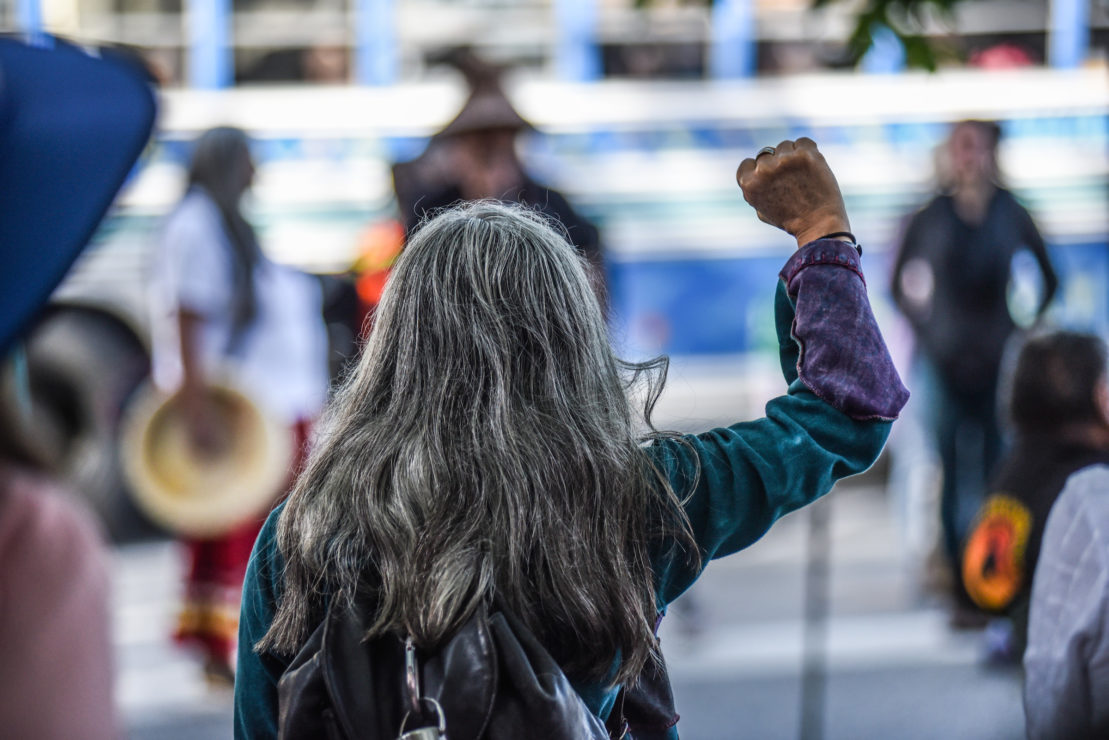The good, the bad, and the always ugly world of pipeline politics

The Wet’suwet’en hereditary chiefs evicted Coastal GasLink workers earlier this month, clearly expressing their lack of consent for the pipeline on unceded lands. Throughout the past few weeks, protests have responded to the international call for solidarity from Unist’ot’en Camp and Gidimt’en Checkpoint.
Somehow, the B.C. government has deemed that the Coastal GasLink pipeline is a worth supporting, while the TransMountain pipeline expansion should be condemned. Both pipelines did not get the consent of the Indigenous peoples on whose ancestral territories the pipelines are proposed to occupy, and would further harm the environment.
While Premier John Horgan and his cabinet have seemingly taken the moral high ground in dealings with Alberta and the federal government over the Trans-Mountain Pipeline, it hasn’t been reflected in their provincial governance.
Instead, the B.C. NDP government has trampled over Indigenous rights through the building of the Site C dam, selling off of B.C. water to the Nestlé corporation for pennies on the dollar, and finally through the RCMP’s forcible dismantling of the Wet’suwet’en blockade in order to allow Coastal GasLink to build their LNG pipeline.
Even preceding all the impacts that could come from building a pipeline — regardless of how careful the company might be — the Coastal GasLink Pipeline has been called out for the failure to complete an archaeological impact assessment which resulted in the halting of the project in August. Worse still, Coastal GasLink had already broken ground and bulldozed a section of the Wet’suwet’en’s Kweese War Trail without consent from the Wet’suwet’en or an architectural assessment to inform them of the sensitive and important nature of the area.
Premier John Horgan has repeatedly raised his concerns that the Trans-Mountain Pipeline expansion would increase tanker traffic coming out of the Port of Vancouver and thus raise the likelihood of an oil spill in the tight corridors of the Salish Sea. In addition, Horgan ordered the B.C. government to join the court challenge launched by the Squamish and Tsleil-Waututh nations (in conjunction with the City of Vancouver and City of Burnaby) arguing that there was inadequate consultation with the Indigenous peoples whose lands will be appropriated for the building of the pipeline.
If a pipeline is built on unceded lands without Indigenous consent, isn’t that always against the United Nations Declaration on the Rights of Indigenous People (UNDRIP) that B.C. implemented just weeks ago?
In contrast, the Coastal GasLink Pipeline has been portrayed by Horgan and his government as an environmentally-sound economic development project which has the consent of the Indigenous peoples whose land it will run through.
The environmental impact of building pipelines is a difficult thing to fully quantify. There are so many unseen problems that occur and damage the lives of humans and wildlife, and the hidden nature of these problems causes them to go unnoticed by many. Streams and rivers are at risk when pipelines are built and maintained. Sediment flowing into rivers can kill fish populations and the death of fish and pollution of the water impacts nearby communities that rely on these resources to support their families or maintain traditions.
The hereditary chiefs of the Wet’suwet’en are actively protesting the building of the pipeline and did not give consent for this project on their land. The hereditary chiefs of the Wet’suwet’en are the legitimate authorities of all decisions regarding their land — as was recognized by the Supreme Court of Canada in 1997.
Thus, Horgan cannot say he has Indigenous consent under either Canadian or Indigenous law.
If a pipeline is built on unceded lands without Indigenous consent, isn’t that always against the United Nations Declaration on the Rights of Indigenous People (UNDRIP) that B.C. implemented just weeks ago?
UNDRIP gives Indigenous peoples the “right to determine and develop priorities and strategies for the development or use of their lands or territories and other resources.”
However, UNDRIP also contains Article 46(1), which states “Nothing in this Declaration may be … construed as authorizing or encouraging any action which would dismember or impair, totally or in part, the territorial integrity or political unity of sovereign and independent states.”
We had hoped that the provincial government would act on good faith and be sincere in their expressed desire to enact meaningful reconciliation but, despite this seemingly important milestone, it appears that the provincial government is only willing to stick with reconciliation when it’s politically convenient.
Premier Horgan needs to stop attempting to take a moral high ground on this issue, as it is evidently that the implementation of UNDRIP and all his talk about environmental protection are simply a smokescreen. Horgan and the B.C. provincial government have attempted to differentiate between the Trans-Mountain Pipeline and the Coastal GasLink LNG Pipeline as “good” and “bad,” when in reality there is no “good” pipeline that ignores consent and sovereignty of Indigenous peoples and inflicts environmental harm.







